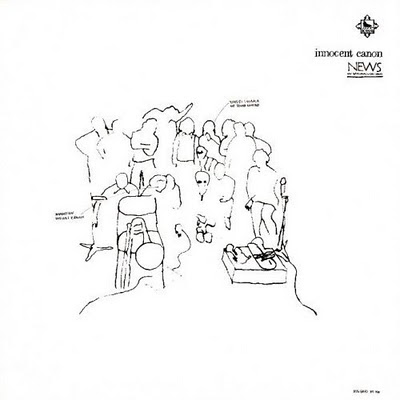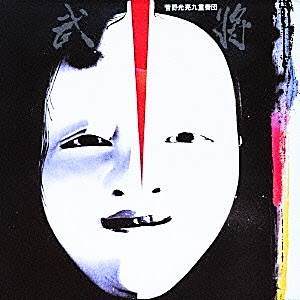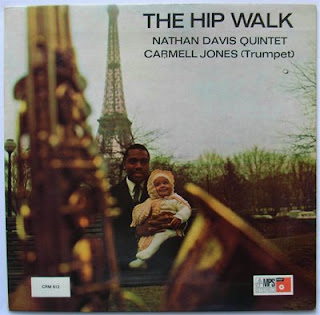TAKESHI INOMATA - INNOCENT CANON

Takeshi Inomata & Sound L.t.d. for King Records Japan from 1971.
Takeshi Inomata(drums)Shunzou Ohno (trumpet/flugelhorn) Shigehito Ohhara (elec.piano/ Hammond Organ /piano)J.F.Conception(sop.alt.ten.sax/flute)Jun Suzuki (elec.base/pianica/whistle solo)Takehisa Suzuki (trumpet/piccolo trumpet/flugelhorn)Shigemichi Dohmoto (trombone/vib.)Osamu Nakajima (percussion)Kimio MIzitani (elec.guitar/fork guitar/sitar)Toshiaki Yokota (flute/bass/alto flute/blockflute/piccolo)Noriaki Kanoh (narration)
This one's been on heavy rotation at Bacoso's Big Top for weeks a mad mix of psyche jazz fusion and whistling(!)...totally bonkers stuff from Inomata and his Sound of Sound crew.
Here's a review lifted from a thread on Japanese progressive rock over at ProgArchives.com put together by DamoX(Jap.Psych Specialist) which really captures the essence of the album:
A borderless creation by borderless musicians.
One of the matchlessly eccentric sound kaleidoscopes - even in Japan every reviewer called him as a musician with a warped soundscape. Yes, he might be a confuser (in a good sense). Amazingly, Takeshi promoted Noriaki KANOH, a young and promising photographer, to a narrator (free talker?) in this album. Such a strategy we could not find in another one in 1971. Anyway, 1971 was a golden year for Japanese progressive rock scene, as I've mentioned again and again ... and the credit of Kimio MIZUTANI can be found on lots of album sleeves in that year. Even in 'Innocent Canon', Kimio's aggressive guitar solo can lead all instruments and all listeners. And yeah, Takeshi's strict drumming absolutely can support this 'air' and 'ground'. The narration by Noriaki (currently he's called 'Tenmei' though) is sometimes lazy, sometimes unique, and sometimes ardent. Mysteriously, for me his talk was boring previously, but to listen to this stuffs again and again has interested me in his fuzzy fascination for music.
This album cannot be discussed only under the category of jazz-rock, though Takeshi was (and is) a renowned Japanese jazz drummer indeed. Kimio's heavy guitar and ethnic sitar, Toshiaki YOKOTA's mind-altering flute, and especially Noriaki's flat narration - all elements can make these songs more psychedelic and more avantgarde. Listen to the first track Introduction directly ... heavy, headaching, hypnotic riffs and enthusiastic but level narrations are very typical upon Japanese psychedelic progressive rock scene in the early 70s. In the next The Death Of Janis (dedicated to Janis Joplin) Toshiaki's flute solo is very mind-blowing, in spite of Noriaki's sensitive talk. The third Go For Nothing has violent 'NO!' voices and at the same time a delightful, pleasant jazz ensemble ... this contrast is wonderful. Alone, the sixth, is very impressive with Oriental fragile mood by Kimio's sitar. We feel impulsive tension even in the last song Epilog, where Jun SUZUKI's whistle be very comfortable indeed.
Highly recommended as a very strange footprint on Japanese music scene.
ALL KILLER NO FILLER!!!


